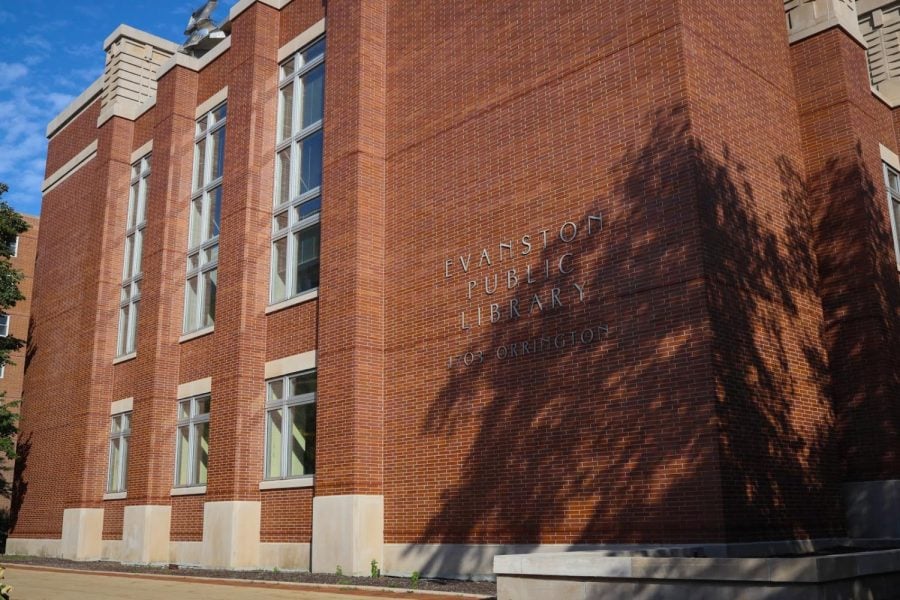Evanston book clubs, literary drives expand elementary and middle school youth literacy
Daily file photo by Joanne Haner/Assistant Photo Editor
Kids’ book clubs from Evanston Public Library are among a plethora of youth literacy efforts currently active and engaging kids to read in Evanston.
October 27, 2021
Every year since 2015, a team of first through eighth graders have assembled at the Evanston Public Library (or more recently, over Zoom) to carry out a crucial literary mission — voting for the next Caldecott Medal winning picture book, or the next Caldecott Club pick.
EPL’s Caldecott Club is one of many programs, from book clubs to book drives, currently promoting youth literacy in Evanston. At each hour-long monthly Zoom, about 20 attendees read six picture books, discuss their illustrations and send two to the final Caldecott voting party in January.
Children’s librarian Brian Wilson, who coordinates the club and sat on the Caldecott selection committee in 2017, works every month to select books covering a variety of art styles, topics and moods. One year, he said, the club actually predicted Matthew Cordell’s 2018 win for “Wolf In The Snow.”
According to Wilson, meetings are structured less like a typical book club discussion and more like an art walk. He said he’s been surprised by some truly thoughtful responses from younger members.
“We ask them questions like, ‘How does the art make you feel?’” Wilson said. “‘Do you think the art matches the story? Do you think it does a good job telling the story?’”
EPL STEM Experiences Library Assistant Kennedy Joseph agreed that getting kids to engage with literature is a great way to promote emotional intelligence skills. They said this helps kids practice empathy when working in fields such as science, technology, art and math.
“The idea is adding a type of emotional aspect,” Joseph said. “How are we interacting with these problems? And how are these problems affecting the outside world? How do we feel about the materials that we’re working with?”
This month, Joseph launched EPL’s newest programming: the Young Scientists book club. There, participants aged 8-10 discuss a STEM-focused monthly fantasy, science fiction or graphic novel pick. Afterwards, members do a science experiment together over Zoom.
Joseph prepares kits with all of the experiment components for pickup before meetings, which they think are essential in youth literary programming. To this end, they also try to select books centering characters of marginalized identities or with disabilities.
They said they hope to use youth literature as a tool to normalize extra accessibility needs — even within science fiction worlds — and to inspire conversations among club members about a variety of social issues. At its first meeting this past month, five participants read Gordon Korman’s “Masterminds” and discussed themes of censorship.
Joseph has found that their readers have been excited to have a space to discuss books outside of a school context.
“Even if they don’t really have much to say, they just want to be in a space where other kids are, excited to talk about something that really interests them,” Joseph said.
For Derrick Ramsey, the co-founder of children’s book nonprofit Young, Black & Lit, getting kids excited about reading independently also means promoting access to characters and themes that ring true to their lives.
Young, Black & Lit, which was founded in 2018, brings free books centering Black voices to schools and community events around Evanston, Chicago and Cook County. One of its first ‘Lit Monthly’ drives took place at Oakton Elementary School, where students had a selection of about 150 picture books to take home. YBL is on track to give away 25,000 books this year.
Currently, YBL also offers ‘Lit Year’ drives in Cook County schools, where K-3 students take home a book each month with the hope of building up a home library. The group also works with Evanston Cradle to Career, EPL and other Evanston community organizations.
Only 12% of childrens’ books produced annually feature Black characters, Ramsey said. This, along with persistent negative media narratives surrounding Black youth, he said, means it can be especially affirming and promote confidence when young readers have increased opportunities to see themselves in the books they’re reading.
“Anytime we’re giving out books, you can see some kid who comes up to the table and says, ‘Hey, this kid looks like me. This kid, you know, represents me,’” Ramsey said. “It’s always a joy to see they’re seeing themselves in the stories they read (and) feeling secured by the stories they read.”
Email: [email protected]
Twitter: @ilana_arougheti
Related Stories:
— Dogs help children practice reading skills at Evanston Public Library


